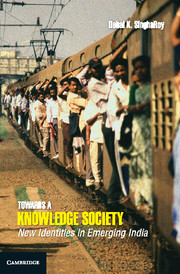Book contents
- Frontmatter
- Contents
- List of Tables and Figures
- Preface
- 1 Introduction: Conceptualising Knowledge Society: Critical Dimensions and Ideal Image
- 2 Critiquing and Contextualising Knowledge Society
- 3 Strategising for Knowledge Society in India: The Shifting Backdrops and Emerging Contexts
- 4 Education for Knowledge Society in India
- 5 Information and Communication Technologies for Knowledge Society
- 6 Indian Growth Story: Service and Knowledge Dynamics
- 7 Education, ICTs and Work: The Divergent Empirical Reality
- 8 Knowledge Society: Work, Workers and Work Relations
- 9 Knowledge Society: Culture, Continuity and Contradictions
- 10 Conclusion: Marginality, Identity, Fluidity and Beyond
- Bibliography
- Index
10 - Conclusion: Marginality, Identity, Fluidity and Beyond
Published online by Cambridge University Press: 05 August 2014
- Frontmatter
- Contents
- List of Tables and Figures
- Preface
- 1 Introduction: Conceptualising Knowledge Society: Critical Dimensions and Ideal Image
- 2 Critiquing and Contextualising Knowledge Society
- 3 Strategising for Knowledge Society in India: The Shifting Backdrops and Emerging Contexts
- 4 Education for Knowledge Society in India
- 5 Information and Communication Technologies for Knowledge Society
- 6 Indian Growth Story: Service and Knowledge Dynamics
- 7 Education, ICTs and Work: The Divergent Empirical Reality
- 8 Knowledge Society: Work, Workers and Work Relations
- 9 Knowledge Society: Culture, Continuity and Contradictions
- 10 Conclusion: Marginality, Identity, Fluidity and Beyond
- Bibliography
- Index
Summary
The composite framework of Indian society that has remained grounded on unequal distribution of economic resources, social status, political power and formal authority, on the one hand, and traditional division based on the principle of caste, ethnicity and gender, on the other, has retained a vast section of its population to be marginalised despite broad processes of social transition and economic transformation and varieties of state-sponsored reformative and developmental initiatives in general and agricultural modernisation and industrialisation in particular. In an unequal society where the poor, powerless and the disadvantaged people are denied and deprived of social, economic and cultural opportunities for integration with the larger society and where the traditional institutional arrangements and values have provided the legitimacy to such denials and deprivations, knowledge society has been envisaged to break these barriers to equal opportunities and social integration, to enable everybody to be powerful through their own capability and to bring a new social order founded on equality, dignity and humanity by developing their inner unlimited resource, the knowledge (UNDP, 2001). In fact, ‘this mixture of justified hope, positive expectations of high quality life for all people everywhere’ makes the development and application of knowledge as well as living in the knowledge-(based) society the overriding interest of society as a whole (UN, 2005).
- Type
- Chapter
- Information
- Towards a Knowledge SocietyNew Identities in Emerging India, pp. 302 - 350Publisher: Cambridge University PressPrint publication year: 2014



